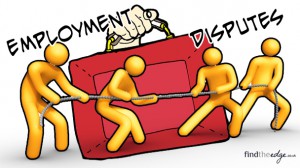 Employment tribunals can be very messy. Here is some advice to help you deal with them as cleanly and effectively as possible:
Employment tribunals can be very messy. Here is some advice to help you deal with them as cleanly and effectively as possible:
Always remember these key points when it comes to employment disputes:
1. They are personal
Anger, grief, envy, passion, ego, spite, lust, hate, loyalty, greed, love … all human life can be found in them!
2. They are intractable
My perception of my worth, the way you have treated me, and your motives are totally different from your perception. Neither of us will budge, so &!%*$ you!
3. They are detailed
And that is where the devil lurks – usually in half-forgotten, ill-judged e-mails, or throw-away comments.
4. They are resolvable
Usually by focussing on the future, rather than the past.
The lessons to draw from them:
1. When dealing with people, take emotions into account – your own as well as others’
For example, the success of your business is very important to you – you are passionate about it.
This is great. Your passion for the business is infectious – this is even better! But do not assume that everybody feels the same way about it as you do.
Why should they? They may not have as large a stake in the business as you do. Their personal circumstances may mean that their priorities are different.
If you feel angry that someone is not contributing as much as they should be, learn to channel that anger into dealing with the issue constructively. If necessary, take anger out on a suitable inanimate object (in private!).
Learn to read people’s body language – what they are saying verbally is not necessarily what they mean.
For example, if their posture is closed (arms folded or body hunched up), even though they may be saying they agree with you, the likelihood is that they do not.
Rather than taking what they say at face value, try to get them to open up. Try, “Correct me if I’m wrong, but I get the impression that you have reservations about this. Tell me about them.”
Recognise when a person’s ego is feeling bruised and learn how to massage it better (metaphorically, NOT physically …). We all like to think we are not status-conscious. But we all are. Very.
2. In a dispute, do not try to convince the other party that you are right
You will not succeed. Your head will make repeated contact with a brick wall.
Try to find a way around the problem, such as by reaching an agreement on how similar issues will be dealt with in the future.
If you cannot find a way around the problem, focus on preparing to convince the Court or Tribunal that you did the right thing, rather than the other party.
But if there are serious flaws in the other side’s case, highlight them as garishly as possible.
This will not convince them that they are wrong, but might create enough nagging doubt to bring them to the negotiating table on a more reasonable basis.
3. Take care with communications – especially e-mails
Never write anything in an e-mail or text message that you would not be happy to see published in a newspaper or read out in Court – unless it is a legally privileged communication with your lawyers.
Keep records of reasonable steps that you take to deal with employees in potential dispute situations. For example, if you have an informal meeting with an employee to try to help, or encourage them to improve their performance, jot down a note of it immediately afterwards.
It is often a good idea to e-mail the note to yourself, so that there is a clear record of the date and time on which the note was made.
This will make it more difficult for anyone to accuse you of making it up later in the light of future events. It will also help you produce a credible and convincing witness statement, if necessary.
4. In most cases, settle if possible
Litigation is, generally speaking, for mugs. Lawyers love it, for obvious reasons. But for the parties, it is almost always preferable to settle, at an early stage if possible.
There may be some cases that should be fought as a matter of principle – but they are rare.
The costs, time and stress involved in fighting the case should be taken into account.
There is invariably a degree of risk that you will lose the case – no matter how bullish you feel – mainly because much will depend on how the witness evidence comes across to the Court or Tribunal during the hearing.
There may be a degree of sympathy on the bench for the Claimant. He or she may come across as more credible than you or some of your witnesses.
If negotiation is difficult, always consider mediation as a way of reaching an agreed resolution.
So, in summary:
- Tap into emotions – both your own and others’
- Do not try to ram your own perceptions of events down anyone else’s throat
- Always ENGAGE BRAIN before you press “send”
- In most cases, settle if possible





